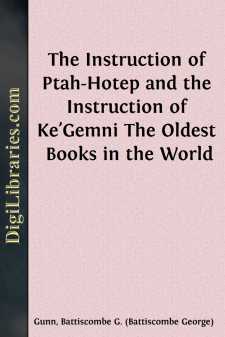Categories
- Antiques & Collectibles 13
- Architecture 36
- Art 48
- Bibles 22
- Biography & Autobiography 813
- Body, Mind & Spirit 142
- Business & Economics 28
- Children's Books 16
- Children's Fiction 13
- Computers 4
- Cooking 94
- Crafts & Hobbies 4
- Drama 346
- Education 46
- Family & Relationships 57
- Fiction 11829
- Games 19
- Gardening 17
- Health & Fitness 34
- History 1377
- House & Home 1
- Humor 147
- Juvenile Fiction 1873
- Juvenile Nonfiction 202
- Language Arts & Disciplines 88
- Law 16
- Literary Collections 686
- Literary Criticism 179
- Mathematics 13
- Medical 41
- Music 40
- Nature 179
- Non-Classifiable 1768
- Performing Arts 7
- Periodicals 1453
- Philosophy 64
- Photography 2
- Poetry 896
- Political Science 203
- Psychology 42
- Reference 154
- Religion 513
- Science 126
- Self-Help 84
- Social Science 81
- Sports & Recreation 34
- Study Aids 3
- Technology & Engineering 59
- Transportation 23
- Travel 463
- True Crime 29
The Instruction of Ptah-Hotep and the Instruction of Ke'Gemni The Oldest Books in the World
Categories:
Description:
Excerpt
Is there anything whereof it may be said,
See, this is new!
It hath been already of old time,
Which was before us.
There is no remembrance of former things;
Neither shall there be any remembrance
Of things that are to come
With those that shall come after.
In these days, when all things and memories of the past are at length become not only subservient to, but submerged by, the matters and needs of the immediate present, those paths of knowledge that lead into regions seemingly remote from such needs are somewhat discredited; and the aims of those that follow them whither they lead are regarded as quite out of touch with the real interests of life. Very greatly is this so with archaeology, and the study of ancient and curious tongues, and searchings into old thoughts on high and ever-insistent questions; a public which has hardly time to read more than its daily newspaper and its weekly novel has denounced—almost dismissed—them, with many other noble and wonderful things, as 'unpractical,' whatever that vague and hollow word may mean.
As to those matters which lie very far back, concerning the lands of several thousand years ago, it is very generally held that they are the proper and peculiar province of specialists, dry-as-dusts, and persons with an irreducible minimum of human nature. It is thought that knowledge concerning them, not the blank ignorance regarding them that almost everywhere obtains, is a thing of which to be rather ashamed, a detrimental possession; in a word, that the subject is not only unprofitable (a grave offence), but also uninteresting, and therefore contemptible. This is a true estimate of general opinion, although there are those who will, for their own sakes, gainsay it.
When, therefore, I state that one of the writings herein translated has an age of nearly six thousand years, and that another is but five hundred years younger, it is likely that many will find this sufficient reason against further perusal, deeming it impossible that such things can possess attraction for one not an enthusiast for them. Yet so few are the voices across so great a span of years that those among them having anything to tell us should be welcome exceedingly; whereas, for the most part, they have cried in the wilderness of neglect hitherto, or fallen on ears filled with the clamour of more instant things.
I could show, if this were a fitting place, that Archaeology is not at all divorced from life, nor even devoid of emotion as subtle and strange, as swift and moving, as that experienced by those who love and follow Art. She, Archaeology, is, for those who know her, full of such emotion; garbed in an imperishable glamour, she is raised far above the turmoil of the present on the wings of Imagination. Her eyes are sombre with the memory of the wisdom driven from her scattered sanctuaries; and at her lips wonderful things strive for utterance. In her are gathered together the longings and the laughter, the fears and failures, the sins and splendours and achievements of innumerable generations of men; and by her we are shown all the elemental and terrible passions of the unchanging soul of man, to which all cultures and philosophies are but garments to hide its nakedness; and thus in her, as in Art, some of us may realise ourselves....


